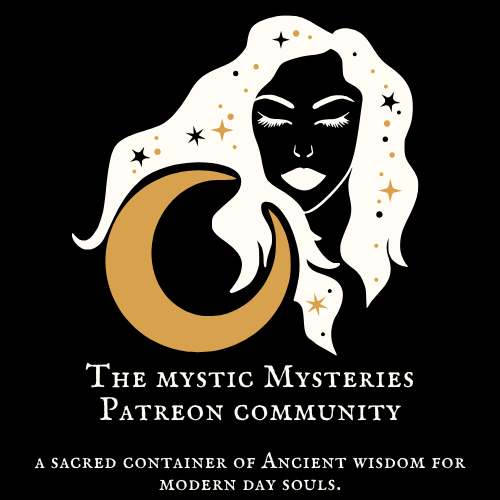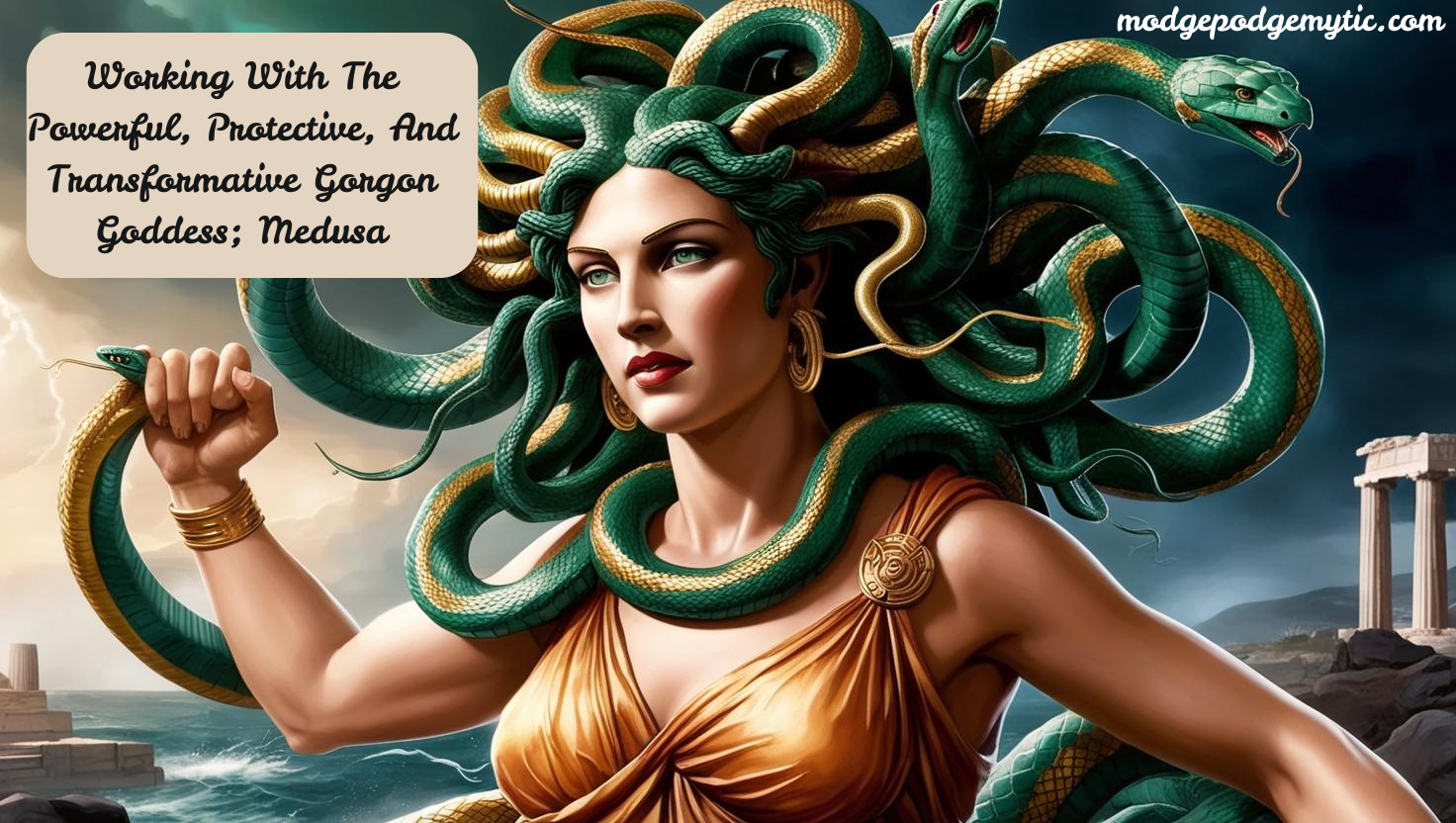

In the beginning, there was a delicate balance of light and shadow, a dance of life and death that birthed the cycles of existence. From this primal harmony emerged Persephone, the Greek goddess of spring, queen of the underworld, and a deity of profound transformation. For over a decade, Persephone has been my matron deity, a guiding force through my own seasons of growth, loss, and rebirth. Her story isn’t the oversimplified tale of abduction so often told—it’s a saga of strength, love, and self-sovereignty, a narrative of evolution and taking your own power. Persephone teaches us to embrace our dual nature, to love fiercely, and to bloom through the darkest soil. Come join me as we walk the path between meadow and underworld to learn more about Persephone in this blog post.
Who is Persephone?
When spring blooms and the earth awakens, or when the shadows deepen and the underworld calls, you may feel a gentle yet commanding presence—Persephone, whispering your name. She is a goddess of duality, associated with spring, renewal, the underworld, death, rebirth, sovereignty, love, transformation, and the mysteries of life’s cycles. Persephone holds dominion over the blooming earth and the shadowy depths, weaving light and dark into a sacred balance. She governs the cycles of nature—growth in spring, decay in autumn—and the passage of souls between worlds, creating a rhythm that echoes through our lives. As a goddess who bridges life and death, she plays an integral role in our existence, guiding us through change and empowering us to claim our own power.
Persephone isn’t just an Olympian goddess; her origins tie her to ancient, pre-Olympian traditions, where she was revered as a chthonic deity of the earth’s fertility and the underworld’s mysteries. She’s not a passive maiden but a queen who chose her path, a symbol of evolution who transforms from Kore (the maiden) to Persephone (the dread queen). Her story resonates with those who seek to integrate their light and shadow, to evolve through challenges, and to stand in their sovereignty.
Persephone, Goddess of Spring and Underworld
Persephone is the embodiment of spring’s renewal and the underworld’s depth in Greek mythology, a formidable goddess in her own right. Her name, often interpreted as “bringer of destruction” or “she who brings light,” reflects her dual nature—both life-giving and death-embracing. As the goddess of spring, she blankets the earth in flowers, her laughter coaxing buds to bloom. As queen of the underworld, she rules alongside Hades, her throne a testament to her power over the dead. In fact, when heroes must travel to the underworld during trials , it is HER they seek permission from to complete their task. She represents the cycles of nature and the soul, embodying the seed that must descend into darkness to grow, the woman who claims her crown through transformation.

Persephone, a Deity of Evolution and Power
Persephone’s story is often reduced to the Homeric Hymn to Demeter, where Hades abducts her, and her mother, Demeter, mourns, causing the earth to wither. But this is only one version, filtered through a patriarchal lens that strips her of agency. Older myths, like those in the Orphic tradition, tell a different tale: Persephone willingly descends to the underworld, drawn to its mysteries and her destiny as queen. Some versions suggest she ate the pomegranate seeds knowingly, binding herself to Hades by choice, not trickery. In these tellings, Persephone isn’t a victim—she’s a goddess who claims her throne, balancing life and death with fierce grace.
Her marriage to Hades isn’t one of coercion but of deep, transformative love. Ancient art often depicts them side by side, equals in power, their bond a sacred partnership. Hades honors her, and Persephone brings light to his realm, softening its edges with spring’s renewal. Their love is a testament to balance—light and shadow, life and death, united in harmony. Persephone’s journey is one of evolution: from Kore, the maiden of spring, to Persephone, the dread queen. Each spring, she returns to the upper world, a symbol of rebirth, but she never abandons her throne below. She teaches us that true power comes from integrating our dualities, from embracing the dark as fertile soil for growth.
Family and Origin
Persephone is the daughter of Zeus, king of the Olympian gods, and Demeter, goddess of the harvest. Her lineage places her among the Olympians, but her role as a chthonic deity ties her to older, pre-Olympian traditions of earth and underworld worship. She’s often associated with her mother’s realm of agriculture and her father’s divine authority, but her true power lies in her own domain—the underworld, where she rules as queen.
Persephone and Hades had no children in most myths, though some traditions mention offspring like the Erinyes (Furies) or the mysterious Zagreus (Patreon exclusive post coming soon), tied to Orphic mysteries. Her most significant relationship is with Hades, her husband and partner, whose love for her is a cornerstone of her story. She’s also closely tied to her mother, Demeter, whose grief and joy shape the seasons, and to deities like Hecate, who accompanies her in the underworld, lighting her path with torches.

Myths and Legends
Persephone’s myths are varied, reflecting her complex nature. The most well-known is the Homeric Hymn to Demeter, where Hades abducts her while she gathers flowers, and Demeter’s grief causes famine until Zeus intervenes. Persephone eats pomegranate seeds—sometimes six, sometimes one—and is bound to the underworld for part of the year, returning to the upper world in spring. But this tale, written in a patriarchal era, often overlooks Persephone’s agency. Older traditions, like those in Eleusinian Mysteries, portray her descent as a willing act, a rite of passage to claim her queenship. In these versions, the pomegranate is a symbol of her choice, not coercion.
In some myths, Persephone is a fierce judge of souls, deciding fates alongside Hades. In others, she’s a compassionate guide, helping heroes like Orpheus or Psyche navigate the underworld. Her duality is evident in her festivals, like the Eleusinian Mysteries, which celebrated her return as a symbol of spiritual rebirth. Persephone’s story isn’t about loss—it’s about power, love, and evolution, a reminder that we can bloom through the darkest seasons.
Worship of Persephone in Ancient Greece
It’s funny, because in Ancient Greece, Persephone was rarely worshipped. We have very little texts in ancient history with stories of how she was worshipped. Alongside only a few temples we know of that, were underground or near caves, symbolizing her connection to the underworld. If Persephone was worshiped, most of the sources we have are her being worshipped alongside either her husband Hades or primarily her mother, Demeter. This is because springtime comes when she is returned to her mother and it was part of the festival to honor Demeter during the rituals of the Eleusinian Mysteries.
What are the Eleusinian Mysteries?
The Eleusinian Mysteries were a set of important rituals that took place in Greece annually for at least one thousand years. It’s hard for us to know how long for sure, because like in their name they were rituals shrouded in mystery. As they were apart of Greece’s worst kept secret, meant to be part of secret mystical teachings. Eventually so many were part of them almost everyone in the city of Athens knew what the teachings were. Which is why we know as much as we do about them now. The rituals happened sometime in September and commemorated the myth of Demeter and Persephone alongside the changing of the seasons. The priestesses and initiates took on a fourteen day long challenge. Involving purification rituals, sacrifices, fasting, and ending in a procession from Athens to Eleusis. The city that gave Demeter aid and shelter during her search for her daughter. We don’t know exactly what these rites were or the rituals that had to be performed. But, most scholars theorize they were an actual reenactment of the rape and capture of Persephone, followed by the agony of Demeter’s search for her. I will leave it up to you on what you think, this all depends on how they interrupted the story of her “kidnapping” and we just simply don’t know.
Today, modern pagans and witches honor her through seasonal rituals, offerings of flowers and pomegranates, and meditations on life’s cycles.

What does Persephone look like?
When spring arrives and flowers bloom, or when the underworld calls with its shadowy depths, Persephone is there. She often appears as a young woman with golden hair, wearing a crown of flowers in the upper world, her dress woven with blossoms. In the underworld, she’s a regal queen, her robes dark and shimmering, a crown of iron or bone atop her head, holding a pomegranate or a torch. For me, she appears as a figure of light and shadow, her eyes glowing with both warmth and depth, a pomegranate in one hand and a bundle of wheat in the other, symbolizing her dual realms.
Persephone and Her Relationship to Hades
Persephone’s relationship with Hades is one of mutual love and respect, not coercion. In ancient art, they’re depicted as equals, sitting side by side on their thrones, ruling the underworld together. Hades, often misunderstood as a villain, is a devoted partner who honors Persephone’s power. Their love bridges life and death, showing us that true partnership balances light and shadow. Persephone brings renewal to the underworld, while Hades offers her a realm to rule—a perfect harmony of opposites.
Persephone and Duality
As a grey witch, I always look at how a deity’s energy can help me maintain balance and reflect cosmic duality. Persephone’s dual nature as both spring maiden and underworld queen is a profound lesson in integration. She’s nurturing, bringing life to the earth, yet formidable, ruling over the dead with authority. She embodies the duality of light and dark, growth and decay, love and power. Persephone reminds us that we can hold both—blooming in our light while rooting deep into our shadows.

My story with Persephone: A Matron of Strength and Rebirth
Persephone has been my matron deity for over ten years, a guiding light through my own cycles of transformation, a mirror reflecting the many facets of my being, and a beacon of strength when I needed to reclaim my power. When I first connected with her, I was in a season of deep shadow—grieving a profound personal loss, feeling uprooted, and searching for my own sovereignty amidst a storm of emotions that left me feeling like a seedling buried too deep to ever bloom. I was also wrestling with my own complex nature, a tapestry of multiple beings woven into one soul—light and shadow, mystic and warrior, dreamer and realist. I often felt fragmented, unsure how to integrate these identities into a cohesive whole. At the same time, I was grappling with a dynamic in my life that mirrored Persephone’s own struggle: a suffocating relationship with a controlling force, much like her mother, Demeter, who clung to her daughter with an iron grip, unable to let her grow into her own power.
Persephone’s story resonated deeply with me because I saw myself in her desire to escape her mother’s overbearing love. In many myths, Demeter’s devotion to Persephone borders on obsession, keeping her sheltered as Kore, the eternal maiden, and refusing to let her explore the depths of her own destiny. I felt that same weight in my life—a force that wanted to keep me small, safe, and unchanging, even as my soul yearned to break free and evolve. I longed to step into my own power, to embrace the chaos and shadows within me, just as Persephone did when she descended to the underworld. During a meditation one night, under the dim glow of a crescent moon, I felt her presence more vividly than ever before. She appeared at a crossroads between a blooming meadow and a dark cave, her figure both radiant and shadowed, holding a pomegranate in one hand and a torch in the other. Her eyes held the weight of a thousand cycles, and her voice was a soft whisper carrying ancient wisdom: “You are the seed. Descend to grow.” That moment marked the beginning of our sacred bond, a connection that has since woven itself into the very fabric of my spiritual practice.
Through working with Persephone, I’ve learned to embrace my own darkness—not as something to fear, but as fertile soil for growth. She showed me that the shadows I feared were not my enemy but a necessary part of my evolution, a place where I could root deeply and rise stronger. More importantly, she taught me to accept the multiplicity of my nature. I am not one being but many, a constellation of identities that shift and shimmer like the seasons. Persephone, who herself embodies duality—spring maiden and underworld queen—guided me to see this as a strength, not a fracture. She whispered to me in meditations and through synchronicities, encouraging me to weave my many selves into a tapestry of power, to honor the mystic who seeks ancient wisdom, the warrior who fights for her truth, and the dreamer who dances in the light. With her guidance, I learned to stand in my fullness, embracing all that I am without apology.
Persephone’s relationship with Hades also became a profound lesson for me, a reflection of the kind of love that fosters growth rather than stifles it. Unlike the suffocating control of Demeter, Hades offers Persephone a love that empowers her to bloom into her most powerful self. In their sacred partnership, Hades doesn’t seek to diminish her light but to nurture it, providing a realm where she can rule as queen and fully step into her sovereignty. Ancient depictions of them seated side by side on their thrones, equals in power, speak to a love that is both fierce and tender—a love that allows Persephone to evolve while honoring her duality. Hades fosters her growth by giving her the space to explore her shadows, to wield her power over the underworld, and to return to the upper world as a symbol of renewal. Through their love, I learned what it means to be truly seen and supported—to be loved in a way that encourages you to become the most powerful version of yourself. This love is mirrored in my own marriage each and every day.
Over the years, Persephone has guided me through countless seasons of change—times of loss, rebirth, and self-discovery. She’s been a constant presence, her energy a reminder that true strength comes from integrating all parts of myself, from blooming in my light while honoring the depths of my shadow. She’s taught me to love fiercely, as she loves Hades, and to evolve through every season of life, just as she moves between the upper world and the underworld. As my matron, she’s not just a deity I work with—she’s a mirror, reflecting my own journey of transformation, a guide who has helped me escape the confines of those who would keep me small, and a teacher who has shown me how to claim my sovereignty by embracing my many beings. Persephone’s magic has been a lifeline, a reminder that I, too, can descend into my shadows and rise as a queen.

Correspondences for Persephone
First, what is a correspondence? First, what is a correspondence? Correspondences are items or symbols that connect you to a specific energy, honoring and venerating it through representation. Below are correspondences for working with Persephone I have cultivated throughout the years. But, always trust your intuition when choosing what to work with.
- Animals: Pomegranate, bat, dove, deer, black ram
- Planet: Pluto
- Element: Earth
- Sex: Feminine
- Symbols: Pomegranate, spring flowers, torch, crown, wheat, seeds
- Colors: Red, black, green, white, gold
- Themes: Renewal, rebirth, transformation, duality, sovereignty, love, cycles, death, power
- Herbs: Pomegranate, narcissus, willow, mint, poppy, rose, lavender
- Stones/Crystals: Garnet, onyx, amethyst, rose quartz, peridot , lapis lazuli, smoky quartz
- Tarot Cards: The High Priestess, Death, The Empress

How to know Persephone is calling to you?
I get asked this question every time I write or teach about a goddess. Signs from deities are unique to each individual, so trust your intuition and open your clairs to discern her call. You can also choose to work with her even if you don’t feel her reaching out. Here are some signs she may be calling you:
- You feel drawn to pomegranates or spring flowers.
- You’re experiencing a major life transition or rebirth.
- You feel a pull to work with cycles of light and shadow.
- You’re interested in underworld deities or death magic.
- You hear her name or see her symbols (pomegranate, torch) often.
- She appears in dreams, meditations, or visions.
- You feel a connection to both spring and autumn seasons.
- You’re seeking to claim your own power and sovereignty.

Ways To Work With and Connect To Persephone
Everyone’s relationship with deities is unique, whether you see them as personal allies or universal archetypes. Approach Persephone with respect, reverence, and gratitude, while building a relationship through energetic exchange. Here are some ways to connect with her:
- Study Her Myths: Explore her various stories, from the Homeric Hymn to Orphic traditions, to understand her evolution and power. Study her role in the Eleusinian Mysteries and her connection to the underworld. Read about her role in creating the herb mint as she worked through the only betrayal by Hades.
- Call on Her for Transformation: Ask Persephone to guide you through life transitions, helping you integrate light and shadow to evolve into your fullest self.
- Work with Cycles: Honor her through seasonal rituals—planting seeds in spring, reflecting on death in autumn, or meditating on rebirth during equinoxes.
- Dedicate Altar Space: Create an altar with her symbols—pomegranates, flowers, a black and white candle, or a small mirror to reflect her duality.
- Include Her in Underworld Magic: Invoke Persephone during rituals involving death, rebirth, or ancestral work, asking her to guide you through the shadows.
- Divination and Meditation: Use tarot (Death or The High Priestess) or meditation to connect with her, visualizing her at the threshold of light and dark.
- Ask for her assistance when transitioning to a new phase of life, like moving to a new home, to guide you through the change with grace.
- Call on her to help heal generational wounds or family patterns, drawing on her underworld wisdom to bring renewal.
- Invoke her when casting circles for protection, especially those tied to cycles of growth and transformation, visualizing her pomegranate as a shield.
- Offer her the first pomegranate seed of any you eat, symbolizing her journey and your devotion to her cycles.
- Learn about the cycles of nature, such as planting and harvesting, to connect with her springtime growth and underworld roots.
- Consecrate your gardening tools with her sigil to bless your plants and crops, invoking her energy of renewal.
- Call on her to guide you through shadow work, illuminating the dark with her underworld torch to help you transform—check out my eBook on shadow work here, book a 1:1 session with me here, or watch my free class on Divination here. Plus, don’t forget to head to the shop and register for my new course starting at the end of this month!
- Work with flowers and learn floral magic, using blooms like narcissus or poppies to honor her.
- Brew a magical tea with pomegranate or rose petals to connect with her dual energy of spring and the underworld.
- Incorporate Persephone’s sigils into flower crowns or garlands as you create them, weaving her energy into your spring rituals.
- Light candles in dual colors (like green for spring and black for the underworld) around your space to welcome her and balance her energies.
- Learn and perform rituals that honor cycles of life and death, such as release ceremonies or renewal spells.
- Cast spells for transformation and rebirth, asking Persephone to guide you through endings and new beginnings.
- Invite her into your rituals by setting a place for her with a small offering of pomegranate seeds or flowers, symbolizing her presence.
- Take a class on Greek mythology or botany to deepen your understanding of her story and her connection to nature.
- Create an altar dedicated to her duality, adorned with flowers for spring and symbols of the underworld like bones or obsidian.
- Reconnect with ancestors through meditation or offerings, asking Persephone to bridge the worlds of the living and the dead.
- Step into moments of transformation with courage, asking Persephone to help you navigate the unknown.
- Learn to work with the earth, such as composting or foraging, to honor her connection to the cycles of nature.
- Work with elemental magic and the Earth to connect to her goddess of spring side and work with the element of fire to connect to her Queen of the underworld side
- Create a powder with crushed pomegranate seeds and rose petals to use as a transformative barrier for your space, especially around thresholds (check out my Pinterest page for a recipe).
- Practice divination like scrying with a dark mirror or using flower petals, asking Persephone to reveal hidden truths.
- Ask her to join in spring traditions like Ostara or Beltane, or create new ones tied to cycles of renewal and release.
- Transform your space with seasonal decor, using flowers in spring and darker tones in fall to honor her duality.
- Plant and grow a garden with flowers associated with her, like narcissus or roses, to connect with her springtime energy.
- Ask for her protective energy to embrace you during inner child healing, helping you rebirth aspects of yourself.
- Pray, sing, or chant to Persephone during rituals involving growth, death, or transformation.
- Cast creativity spells, invoking her as a goddess of renewal to inspire new ideas and projects.
- Share stories of her myth, especially the Eleusinian Mysteries, to honor her legacy of transformation.
- Dedicate a space in your garden or home to her by placing a statue or image of her nearby, or draw her sigils on stones to place there.
- Ask for her guidance to balance your light and shadow selves, especially during stable Taurus season.
- Invite her into your space during times of renewal, like the start of spring, to bring growth and transformation.
- Use a gratitude practice to cultivate appreciation for the cycles of life and death in your journey.
- Compile a collection of rituals or meditations inspired by her story in a journal to honor her.
- Create a spell jar for transformation, renewal, or ancestral healing, including pomegranate seeds and black tourmaline.
- Wear her sigil on your skin or as jewelry during transitional seasons like spring and fall to carry her energy with you.
- Take a vow to honor one cycle of change in your life, such as a 30-day release ritual, trusting her to guide you.
- Welcome growth into your life, asking Persephone to help you bloom after periods of darkness.
- Use her underworld energy to release old wounds by burying symbolic items in the earth and planting flowers over them.
- Prioritize self-transformation, using her energy to boost your resilience and connection to your inner cycles.
- Decide to do a set timeframe, like 30 days, of working with flower magic to connect with her springtime energy.
- Spend time in nature during spring, hosting a ritual or meditation in a blooming field to honor her.
- Practice generosity by planting trees or flowers in your community in her name, honoring her role in growth and renewal.

Offerings for Persephone
Offerings are a beautiful way to honor Persephone, whether on your altar or in nature. Follow your intuition, and offer them during rituals, meditations, or seasonal celebrations.
- Pomegranate seeds or juice
- Spring flowers (narcissus, roses)
- Black or white candles
- Wine or honey
- Wheat or seeds
- Crystals like garnet or onyx
- Poems or art you create for her
- A small mirror or torch figurine

Ritual to Claim Your Sovereign Power
This ritual calls on Persephone to help you claim your power through integration of light and shadow, perfect for when you’re ready to step into your sovereignty.
Materials:
- Two candles (white for spring, black for the underworld)
- a pomegranate
- a small mirror
- a journal
- pen
Steps:
1. Find a quiet space and place the candles, pomegranate, and mirror before you. Light the candles and breathe deeply, grounding yourself.
2. Call on Persephone: “Persephone, queen of light and shadow, I seek your strength to claim my power.”
Visualize her standing at a threshold, holding a pomegranate.
3. Break open the pomegranate, eat a seed (or touch it to your lips), and say: “I choose my power, as you chose yours.”
4. Look into the mirror, seeing the candlelight reflect your dual nature. Ask: “What power am I ready to claim?”
Listen for her guidance.
5. Journal your insights, writing affirmations of your sovereignty.
6. Thank Persephone and offer the remaining seeds to the earth, extinguishing the candles.
Why work with Persephone?
Persephone’s story is a journey of evolution, a reminder that true power comes from embracing all parts of ourselves. She’s not a victim but a queen who chose her path, who loves fiercely, and who rules with strength. Working with her connects you to the cycles of life and death, helping you bloom through your darkest seasons. She teaches us that transformation isn’t about rejecting the shadow—it’s about integrating it, claiming our sovereignty, and evolving into our fullest selves. Persephone’s magic has transformed my life, and I know she can guide you too.
If you want to deepen your knowledge about Persephone or if you prefer to learn by listening instead of reading check out my class on YouTube below.

A fundamental pillar of Paganism is working with the deities that one believes in. While all practicing Pagans have varying beliefs about the gods and goddesses, most agree that honoring their deities is a great way to connect with them and further their spiritual goals. But, again remember not every pagan works with deities. Also remember there are literally thousands of different deities out there in the multiverse and which ones you choose to honor will often depend significantly upon what pantheon your spiritual path follows. This eBook will walk you thru the different ways to view deities, what a deity can be, and the basics to start building a deep meaningful relationship with one.


I am Kayreign, the Divine Oracle of the Gods and Keeper of Mysteries, a solitary grey magic practitioner with over 15 years of experience walking the sacred paths of the unseen. As a mystic and relentless seeker of all knowledge, I weave together the threads of every magical tradition—light and dark, ancient and modern—to uncover the universal truths that bind us to the cosmos. My mission is to restore and re-enchant magic in this realm, igniting its spark in every soul I encounter, and guiding you to embrace the full spectrum of your being.
My work is rooted in the power of duality, honoring the dance between shadow and light as equal partners in your spiritual journey. I hold space for you to explore all magic paths and practices, drawing from the vast tapestry of mystical wisdom to help you uncover your unique magic and sacred contracts. As the Divine Oracle of the Gods, I channel divine insights to illuminate your path; as the Keeper of Mysteries, I guide you into the depths of the unknown, where true transformation awaits.
When you work with me, you’ll learn to live in energetic balance, embracing your darkness as a source of power, not just a stepping stone to the light. I’ll hold up a mirror to reflect your authentic self—unmasked, raw, and whole—inviting you to face your past wounds, traumas, and hurts with courage. Together, we’ll alchemize every chapter of your story, dark and light, into a blazing internal flame that lights your way on even the coldest nights. Through this process, you’ll find alignment with your purpose, release what holds you back, and step fully into your power.
Come join me for community, knowledge, and to restore the enchantment of magic in yourself and life today!
Explore my offerings—personalized shadow work sessions, womb healing, eBooks for self-guided growth, Tarot readings for divine guidance, and more—in my shop. Let’s journey together into the mysteries, where duality becomes your greatest ally, and magic becomes your birthright.










































